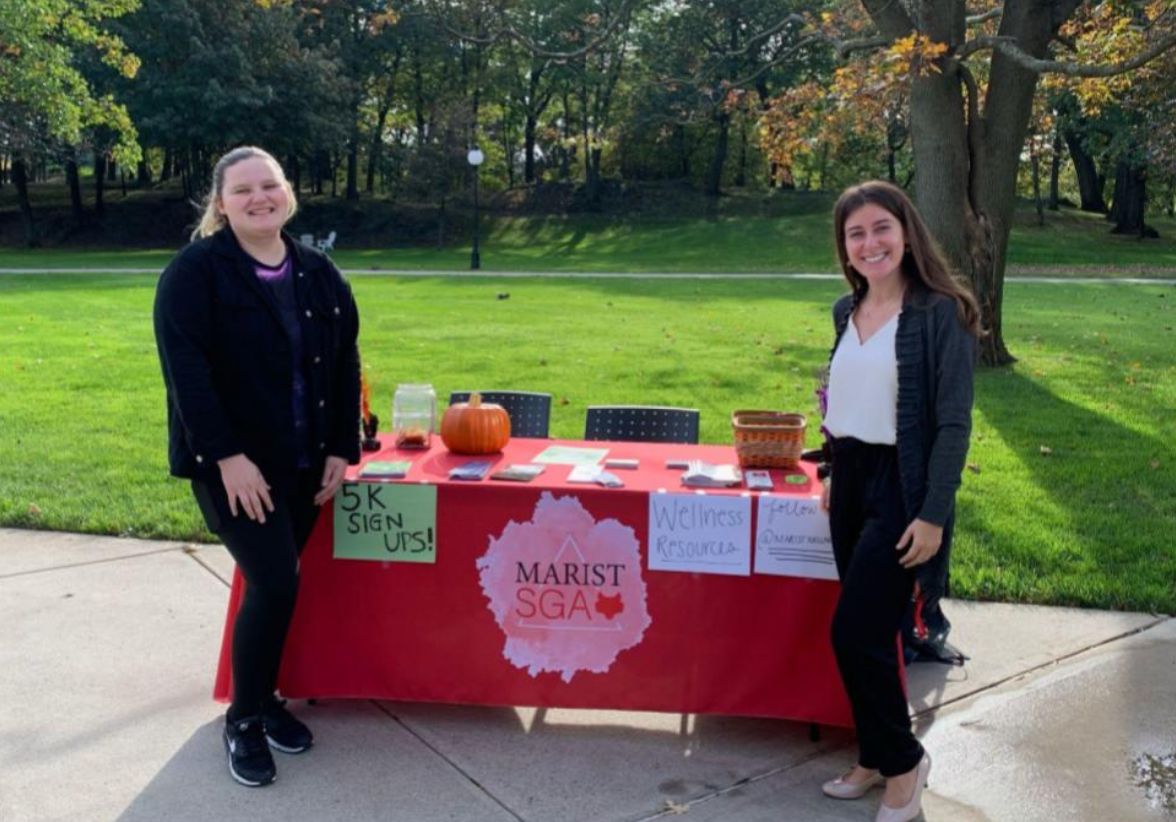Drinking and Drugs: Not Your Ticket to College Fun
Student Government Association’s Wellbeing Board Representatives Lauren and Stella stand on the Marist Green at their pop-up information table. Courtesy of MacKenzie Curtis '23.
At college orientation, they do not mention the prevalence of alcohol and drug abuse as a customary student experience. They do not offer information on it’s warning signs, prevention outlets or advice on how to prioritize one’s well being. Substance abuse is a silent killer, and students and faculty advocate for a change in the harmful status quo.
The national epidemic of substance abuse commonly starts on college campuses, and is no stranger to Marist College.
The Center for Collegiate Mental Health examines trends among college students seeking mental health services. Their findings about students and binge-drinking, marijuana use, and treatment for substance abuse raise red flags about the normalization of drugs in college. During 2019 and 2020, nearly 185,440 students and 153 institutions across the United States responded to related questionnaires about mental health topics.
The collected data shows that 36.9% of college participants binge-drink, and 26.0% use marijuana. While the research collected shows that 27.4% of participants felt the need to reduce their drug and alcohol intake, only 2.3% received treatment for alcohol and drug abuse.
Matt McMahon, the Assistant Dean of Students, says that “a quarter of all students report academic misconduct as a consequence of substance abuse.” The normalization of alcohol and drugs takes a toll on a student's well being and conduct.
Marist College provides mental health resources that are often overlooked. “We have an amazing counseling department and it is underused,” Sophie Park ’25 said.
Dr. Marisa Moore, the Head of Counseling Services, described the normalization of substance abuse to be a result of social pressure and imitating one another.
“It is because [students] see [alcohol abuse] around them, that it is normalized,” Dr. Moore said.
She also explained the psychological term of confirmation bias: the tendency to process information by looking for, or interpreting, information that is consistent with one's existing beliefs. “An idealistic vision of college is oversold,” leading students to chase the party scene and sacrifice their own wellbeing.
To combat the normalization of substance abuse in the college setting, Moore brings up the relevance of desensitization. Marist Counseling offers an “overabundance of information that we get desensitized to.” In psychology, desensitization is a process that diminishes emotional responsiveness to a negative or positive stimulus after repeated exposure to it.
McMahon says that “student wellness needs to be at the forefront of any orientation program.” He offers reasoning for normalization that is similar to Dr. Moore’s. The predisposing notion that college is a place for drinking is harmful to the wellbeing of everyone. “We need to move past this idea where everyone comes to college to drink,” McMahon said.
McMahon has ideas about changing the narrative for risky behavior in college. “There are other ways to make friends in college,” without drinking and doing drugs. With the help of the SGA Wellness Board, the radar team, and a social norms campaign, students will adapt their mindset and behaviors about substances. The newly implemented SGA Wellness Board prioritizes “physical, mental, and social wellbeing,” Board President and Resident Assistant Anna Hagenbuch ‘23 said, “making sure [students] are well rounded and ready for life.”
However it requires more than the work of the college to change the stigma around substance abuse. “We encourage parents to have real, honest conversations about alcohol and other drugs before they come to college,” McMahon says. He also advises parents to let the College know about any concerns, so “they can provide proper resources right away.”
Marist students agree that substance abuse is normalized in college. Rob DeFelice ‘23 said that a large part of why substance abuse is normalized is because of the“sudden freedom” experienced as a freshman.
“I think a lot of college freshmen who move out for the first time realize they have total control of choice and don’t know what to do with themselves,” DeFelice said. Hagenbuch added that substance abuse is a matter of “trying to look cool in front of peers,” and “not knowing their limits.”
DeFelice emphasizes the importance of parents having open conversations with their children. “Education [on substance abuse] is the biggest thing. For me personally, my mom allowed me to consume alcohol within reason. I learned in a safe environment how alcohol affects me and how to handle myself.”
College campuses are breeding grounds for addiction issues in later life. Dr. Moore says that “this environment enables more self-medicating. This is a risk [of addiction] that can turn into post-graduation.” Analyzing this issue from a psychological standpoint, Dr. Moore says that it is a “combination of both nature and nurture,” that leads to alcohol and drug abuse. “[Substance abuse] doesn’t end when you leave college,” McMahon says, “it’s gonna be a constant struggle.”
The most effective resource Dr. Moore has found to help students with substance abuse is the “one-less mentality”. The goal to have one-less drink, one-less night out per week, and even one-less dollar spent on drinks is proven to reduce binge-drinking, Dr. Moore says.
Dr. Moore and Matt McMahon want students to know there are “ways to be proactive if you don’t think you want to engage with [alcohol and drugs]”. McMahon encourages community involvement. Self-care is the greatest substance abuse prevention strategy, Dr. Moore adds.
“If you’re not taking care of yourself, and not dealing with stress you are going to want to engage in these types of activities,” Dr. Moore said.
Self-care practices and open conversations about substance abuse should be at the forefront of the conversation to set students up for success.
